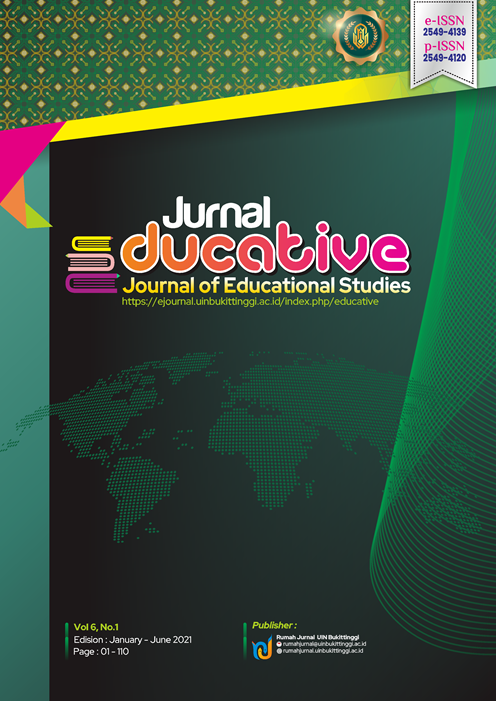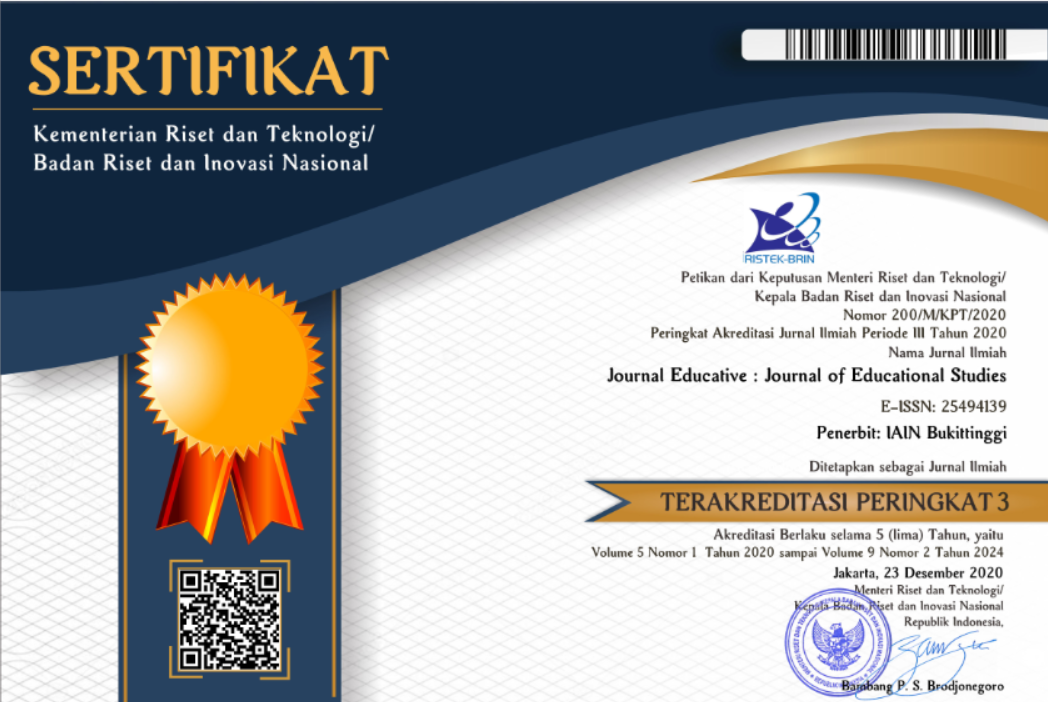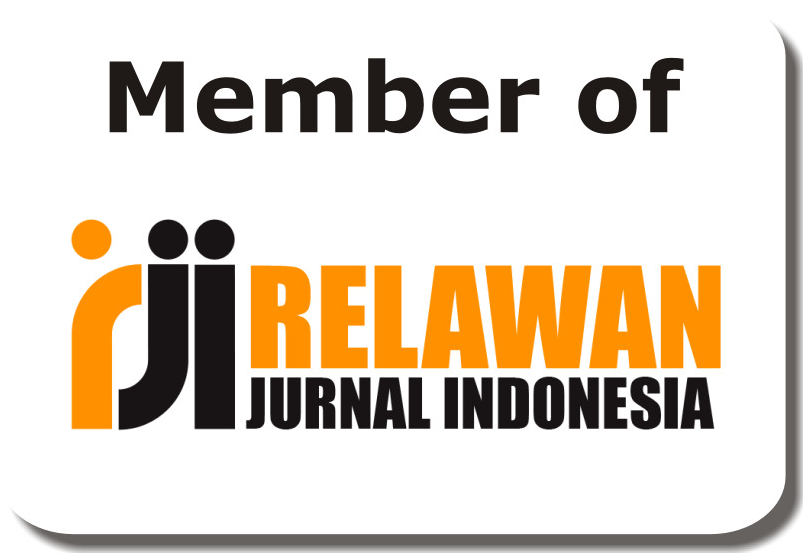Elderly School and Family Resilience: A Case Study of the BKKBN Program in Jambi Province
DOI:
https://doi.org/10.30983/educative.v9i1.8532Keywords:
Elderly School, elderly quality of life, elderly education, family resilienceAbstract
The Elderly School Program in Jambi Province addresses the growing needs of an aging population by providing continuous education and training to enhance their quality of life. While there is a growing demand for resources to support the elderly, significant gaps remain in accessibility and participation across all segments of the elderly population. This study aims to evaluate the effectiveness of the Elderly School Program, specifically its impact on elderly well-being and family resilience. Using a case study methodology, the research involved direct observation, in-depth interviews, and document analysis to assess program implementation. Findings reveal significant improvements in the knowledge, skills, and self-confidence of the elderly, alongside positive impacts on family resilience. The study contributes to the understanding of how structured educational programs can support the elderly and strengthen family bonds, offering recommendations for expanding program reach, enhancing collaboration, and developing relevant educational content.
Program Sekolah Lansia di Provinsi Jambi menangani kebutuhan populasi lanjut usia yang semakin meningkat dengan memberikan pendidikan dan pelatihan berkelanjutan untuk meningkatkan kualitas hidup mereka. Meskipun ada permintaan yang meningkat untuk sumber daya yang mendukung lansia, terdapat kesenjangan signifikan dalam aksesibilitas dan partisipasi di semua segmen populasi lansia. Penelitian ini bertujuan untuk mengevaluasi efektivitas Program Sekolah Lansia, khususnya dampaknya terhadap kesejahteraan lansia dan ketahanan keluarga. Dengan menggunakan metode studi kasus, penelitian ini melibatkan observasi langsung, wawancara mendalam, dan analisis dokumen untuk menilai pelaksanaan program. Temuan menunjukkan peningkatan signifikan dalam pengetahuan, keterampilan, dan kepercayaan diri lansia, serta dampak positif terhadap ketahanan keluarga. Penelitian ini memberikan kontribusi pada pemahaman tentang bagaimana program pendidikan terstruktur dapat mendukung lansia dan memperkuat ikatan keluarga, serta menawarkan rekomendasi untuk memperluas jangkauan program, meningkatkan kolaborasi, dan mengembangkan konten pendidikan yang relevan.
References
Books
Hancock, Dawson R., Bob Algozzine, and Jae Hoon Lim. Doing Case Study Research: A Practical Guide for Beginning Researchers. (2021.
Neuendorf, Kimberly A. "Content Analysis and Thematic Analysis." Advanced Research Methods for Applied Psychology. Routledge, (2018).
Scientific Journal
Arifin, E.N. and Ananta, A., 2016. The past three population censuses: a deepening ageing population in Indonesia. Contemporary demographic transformations in China, India and Indonesia.
Bailey, Laura, Mark Ward, Alexandria DiCosimo, Samyrah Baunta, Conal Cunningham, Roman Romero-Ortuno, Rose Anne Kenny et al. "Physical and mental health of older people while cocooning during the COVID-19 pandemic." QJM: An International Journal of Medicine 114, no. 9 (2021).
Chen, Yi-Ru Regina, and Peter J. Schulz. "The effect of information communication technology interventions on reducing social isolation in the elderly: a systematic review." Journal of medical Internet research 18, no. 1 (2016).
Chiu, Ching-Ju, and Chia-Wen Liu. "Understanding older adult's technology adoption and withdrawal for elderly care and education: mixed method analysis from national survey." Journal of medical internet research 19, no. 11 (2017).
Davitt, Joan K., Elizabeth A. Madigan, Marilyn Rantz, and Lisa Skemp. "Aging in community: developing a more holistic approach to enhance older adults' well-being." Research in gerontological nursing 9, no. 1 (2016).
Dawam, Muhammad, Sri Sugiharti, and Dwi Endah Kurniasih. "Aging Management Model at Dayakan Village—Kulon Progo District, Yogyakarta Special Province." Journal of US-China Public Administration 18, no. 4 (2021).
Francescato, Donata, et al. "Dispositional Characteristics, Relational Well-Being and Perceived Life Satisfaction and Empowerment of Elders." Aging & Mental Health, 21.10 (2017).
Gayatri, Maria, and Dian Kristiani Irawaty. "Family resilience during COVID-19 pandemic: A literature review." The Family Journal 30, no. 2 (2022).
Giraudeau, Caroline, and Nathalie Bailly. "Intergenerational Programs: What Can School-Age Children and Older People Expect from Them? A Systematic Review." European Journal of Ageing, 16 (2019).
Jacobs, F.H., The five-tiered approach to evaluation: Context and implementation. In Evaluating family programs, Routledge, (2017).
Johnston, E., G. Olivas, P. Steele, C. Smith, and L. Bailey, 2018. Exploring pedagogical foundations of existing virtual reality educational applications: A content analysis study. Journal of Educational Technology Systems, 46(4), pp.414-439.
Leeuwen, Van, Karen M., Miriam S. Van Loon, Fenna A. Van Nes, Judith E. Bosmans, Henrica CW De Vet, Johannes CF Ket, Guy AM Widdershoven, and Raymond WJG Ostelo. "What does quality of life mean to older adults? A thematic synthesis." PloS one 14, no. 3 (2019): e0213263.
MacLeod, Stephanie, et al. "The Impact of Resilience Among Older Adults." Geriatric Nursing, 37.4 (2016).
Majumder, Sumit, Emad Aghayi, Moein Noferesti, Hamidreza Memarzadeh-Tehran, Tapas Mondal, Zhibo Pang, and M. Jamal Deen. "Smart homes for elderly healthcare—Recent advances and research challenges." Sensors 17, no. 11 (2017).
Mazhar, Syeda Ayeman, Rubi Anjum, Ammar Ibne Anwar, and Abdul Aziz Khan. "Methods of data collection: A fundamental tool of research." Journal of Integrated Community Health (ISSN 2319-9113) 10, no. 1 (2021).
Oktriyanto, Amrullah, H., Elmanora, Tasqiya, R. S., & Septariana, F. "Family Development Program: Optimizing Family Functions in Indonesia." Journal of Social Service Research, 49.2 (2023), pp. 205–221. <https://doi.org/10.1080/01488376.2023.2217221>.
Rowe, Gladys, et al. "Prioritizing Indigenous Elders’ Knowledge for Intergenerational Well-Being." Canadian Journal on Aging/La Revue canadienne du vieillissement, 39.2 (2020).
Sitohang, Marya Yenita. "Understanding Ageing Population Across Countries: Lesson Learned for Indonesia." Journal of Indonesian Social Sciences and Humanities, 13.2 (2023).
Strauss, Susanne, and Kathrin Trommer. "Productive ageing regimes in Europe: Welfare state typologies explaining elderly Europeans’ participation in paid and unpaid work." Journal of Population Ageing 11, no. 4 (2018).
Xu, Jinxi, and W. Bruce Croft. "Quary expansion using local and global document analysis." In Acm sigir forum, vol. 51, no. 2, New York, NY, USA: ACM, 2017.
Online Reference
"BKKBN Jambi Mewisuda 47 Siswa Sekolah Lansia," Antara News Jambi, 2024 <https://jambi.antaranews.com/berita/562623/bkkbn-jambi-mewisuda-47-siswa-sekolah-lansia> [accessed 1 July 2024].
"Selantang: Sekolah Lansia Tangguh," BKKBN Golantang, 2024 <https://golantang.bkkbn.go.id/selantang-sekolah-lansia-tangguh> [accessed 1 July 2024].
Observation, Interview, and Documentation
Documentation of the Elderly School by BKKBN, Jambi Province, 2024.
Observation, 1-5 June 2024.
Observation, 6-10 June 2024.
Riyatno, Putut (Head of BKKBN Jambi Province). Interview. Monday, July 2 2024.
Downloads
Published
Issue
Section
Citation Check
License
Copyright (c) 2024 Anik Indriani, Muhamad Taridi, Peppy Angraini, Irham M, Ramadhan Ningsih

This work is licensed under a Creative Commons Attribution-ShareAlike 4.0 International License.
Authors who publish with this journal agree to the following terms:
1. Authors retain copyright and grant the journal right of first publication with the work simultaneously licensed under a Creative Commons Attribution License that allows others to share the work with an acknowledgment of the work's authorship and initial publication in this journal.
2. Authors are able to enter into separate, additional contractual arrangements for the non-exclusive distribution of the journal's published version of the work (e.g., post it to an institutional repository or publish it in a book), with an acknowledgment of its initial publication in this journal.
3. Authors are permitted and encouraged to post their work online (e.g., in institutional repositories or on their website) prior to and during the submission process, as it can lead to productive exchanges, as well as earlier and greater citation of published work (See The Effect of Open Access).










